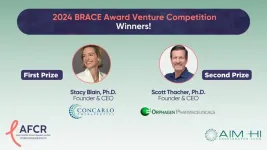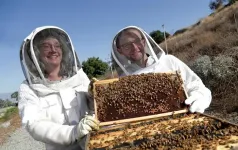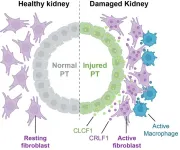(Press-News.org) Hong Kong (5 September 2024) – The Asian Fund for Cancer Research Limited (AFCR) is pleased to announce the winners of the 2024 BRACE Award Venture Competition: the First Prize goes to Concarlo Therapeutics, led by Founder and CEO Stacy Blain, Ph.D., and the Second Prize goes to Orphagen Pharmaceuticals, led by its Founder and CEO Scott Thacher, Ph.D.
AFCR’s BRACE (Bridging Research from Academia to Cancer Entrepreneurship) Award Venture Competition is designed to support and accelerate oncology innovations on their path toward commercialization, aiming to improve outcomes for patients affected by cancer globally. Wit the partnership of AIM-HI Accelerator Fund, we have built an unique program supporting innovative early-stage oncology companies that address cancers prevalent in underserved populations with advisory experts and access to our global network of key opinion leaders and investors.
The 2024 BRACE Venture Competiton Committee reviewed dozens of applications from 10 countries, including Hong Kong, India, Ireland, Israel, Nigeria, Romania, Singapore, Switzerland, the United Kingdom, and the United States. The BRACE Award Venture Competition winner must pass a rigorous evaluation by three of the BRACE program’s blue-ribbon Committees: Selection, Judging, and Investment Due Diligence.
The first prize winner, Concarlo Therapeutics, a preclinical stage biotechnology company, is pioneering a new way to inhibit the three highest value targets in oncology, CDK4/6, and CDK2, creating the elusive triple CDK2/4/6 inhibitor. Their transformative pan-cancer approach will develop medicines to combat drug resistance, which results in more than 10 million cancer deaths worldwide annually. Concarlo Therapeutics has the potential to offer solutions for multiple tumor types and combination treatments. Their small molecule p27 inhibitors are being developed for many tumor types, including pancreatic, esophageal, and ovarian cancers.
The second prize winner, Orphagen Pharmaceuticals, develops first-in-class, small molecule drugs based on previously unexplored targets from the nuclear receptor family. The company’s lead program, OR-449, is an IND-ready, first-in-class small molecule antagonist to SF-1, a candidate tumor driver for pediatric and adult adrenocortical carcinoma (ACC) and the 10-15% of head and neck cancers that are SF-1(high). OR-449 inhibits tumor growth in multiple preclinical models and validates Orphagen’s novel target discovery and development strategy.
In addition, the BRACE Award also conducts a “People’s Choice Award” campaign, voted by the public for the best presentation of video pitch among the 2024 semi-finalists, to promote awareness of innovative cancer technologies. The People’s Choice for Best Pitch goes to Minh-Duy Phan, Ph.D., CEO & Scientific Co-Founder of NexCalibur Therapeutics, a preclinical stage biotechnology company that focuses on developing an innovative platform (NexNeo) to design and produce personalized therapies and preventative vaccines for solid tumor cancers.
“We are honored to be selected by the blue-ribbon committee with the prestigious title of the 2024 BRACE Award Venture Competition First Prize and express our gratitude for the mission of AFCR,” says Concarlo Therapeutics CEO and Founder Dr. Stacy Blain. “On behalf of myself and our entire team, we are grateful to receive this honor from AFCR and the BRACE Award Committee. We will continue our work, , focused on moving our therapies into the clinic in order to improve outcomes for patients with drug resistance cancers.”
“Novel targets and drugs are necessary to combat cancer,” said BRACE Award Venture Competition Selection and Judging Committee Co-Chair Raju Kucherlapati, Ph.D. of Harvard Medical School. “The committee recognizes the potential of Concarlo’s new approach to combat important cancers, that affect patients from around the world. I look forward to following their continued progress as they work to bring their agents to the bedside to help patients.”
“As we enter the 6th year since the inauguration of the BRACE Award Venture Competition, we are proud to be able to provide a valuable network and platform to help and recognize early-stage oncology companies,” Said Dr. Sujuan Ba, Founder and CEO of the Asian Fund for Cancer Research. “The competition continues to advocate and accelerate the development of innovative technologies from the bench to the bedside for cancer patients in Asia and around the world. Concarlo Therapeutics, Orphagen Pharmaceuticals, and NexCalibur Therapeutics represent new hope for cancer patients.”
About the Asian Fund for Cancer Research
The Asian Fund for Cancer Research Limited (AFCR) is a nonprofit organization committed to combatting cancers disproportionately affecting Asian populations. Headquartered in Hong Kong and with a global reach, AFCR is uniquely positioned to investigate the unique causes of cancer in Asian demographics through innovative genetic and molecular research. The organization accelerates cutting-edge cancer research breakthroughs and technologies while developing more potent therapies for cancer patients across Asia and the world. Further information about AFCR can be found at afcr.org.
About AIM-HI Accelerator Fund
The AIM-HI Accelerator Fund (AIM-HI) is a 501(C)(3) non-profit organization created in 2019 by the National Foundation for Cancer Research to provide oncology startups with the resources they need to drive innovative discoveries forward, out of the lab, to the clinics, and eventually to the people battling cancer. Our mission is to bridge the gap between research breakthroughs and clinical trials, aiming to develop innovative cancer therapies and technologies that can save patients’ lives. For more information, visit AIM-HIaccelerator.org.
About the BRACE Award Venture Competition
The Bridging Research from Academia to Cancer Entrepreneurship (BRACE) Award program is designed to provide vital support and network access to early-stage oncology companies, enabling them to accelerate their innovative therapeutics, diagnostics, and cancer prevention products into the clinic, with the ultimate goal of improving outcomes for patients affected by cancer, globally.
The three committee members of the 2024 BRACE Award include the following persons (listed in alphabetical order):
Anna D. Barker, Ph.D., Chief Strategy Officer, Lawrence J. Ellison Institute of Technology
Webster K. Cavenee, Ph.D., Distinguished Professor of Medicine, University of California San Diego
Aleksandra Filipovic, M.D., Ph.D., Head of Oncology, PureTech Health
Pamela Garzone, Ph.D., Chief Development Officer, Anixa Biosciences
Dimitra Georganopoulou, Ph.D., General Partner, Qral Ventures
Gary Gordon, M.D., Ph.D., Senior Medical Advisor and Board Member, Global Coalition for Adaptive Research
Daniel Johnson, Ph.D., Professor and Vice Chair of Research, Department of Otolaryngology-Head and Neck Surgery (OHNS), University of California San Francisco
Raju Kucherlapati, Ph.D., Paul C. Cabot Professor of Genetics and Professor of Medicine, Harvard Medical School
Matthew Lawler, Entrepreneur-In-Residence, Blackbird Laboratories
Brian Leyland-Jones, MBBS, Ph.D., Chief Medical Officer, National Foundation for Cancer Research
Scott Lippman, M.D., Distinguished Professor of Medicine & Associate Vice Chancellor for Cancer Research, UC San Diego Health
Jimmy Lu, JD, MBA, Co-Founder and Managing Director, Eos BioInnovation
Eva Martin, M.D., Senior Director, Alliance and Asset Management, Roche Pharma Partnering
Gregory W. Mitchell, Ph.D., JD, Of Counsel, Wilson Sonsini Goodrich & Rosati
Kornelia Polyak, MD, Ph.D., Professor of Medicine, Dana-Farber Cancer Institute
Michael Salgaller, Ph.D., Supervisory Invention Development & Marketing Specialist, National Institutes of Health/National Cancer Institute
Libia F. Scheller, Ph.D., MBA, Global Head Oncology-Cooperative Groups & Strategic Alliances, Bayer Health Care Pharmaceuticals
Fei Shen, Ph.D., Managing Director, Boehringer Ingelheim Venture Fund USA
Matt Tremblay, Ph.D., CEO, Blackbird Laboratories
Past First Prize Winners of the BRACE Award Venture Competition include:
2023 - Degron Therapeutics, Lily Zou, Ph.D., MBA, Co-Founder and CEO
2022 – Believer Pharmaceuticals, Bee Hui Liu, Ph.D., Co-Founder
2021 - Chimera Bioengineering, Gus Zeiner, Ph.D., Co-Founder
2020 – Arbele Bio, Dennis Wong, MD, Chief Development Officer
2019 – DotBio, Ignacio Asial, Ph.D., Founder and CEO
Learn more about the BRACE Award Venture Competition at https://afcr.org/en/Brace-Award/
END
Asian Fund for Cancer Research announces winner of the 2024 BRACE Award Venture Competition
2024-09-05
ELSE PRESS RELEASES FROM THIS DATE:
Analysis found weight-loss surgery may help people with obesity manage high blood pressure
2024-09-05
Research Highlights:
In an analysis of 18 randomized clinical trials, people with obesity and high blood pressure who underwent bariatric (weight-loss) surgery were almost three times more likely to achieve blood pressure remission, defined as reducing to less than 140/90 mm Hg and no longer taking antihypertensive medication, and keep it under control in comparison to peers treated with medication and healthy lifestyle adjustments.
Over a 1-to-5-year follow-up period, people with obesity who ...
New AI hair analysis method holds promise for improved health research
2024-09-05
PULLMAN, Wash. — A new application that uses artificial intelligence may revolutionize the way scientists study hair and could lead to the development of health diagnostics based solely on hair.
The AI model speeds up and streamlines the hair quantification process, allowing a microscope to scan slides and collect images of hundreds of hairs at a time. In a matter of seconds, it can capture an abundance of high-resolution data that is then processed with a deep learning algorithm that collects the color, shape, width and length of each individual hair. Researchers tested it using mouse fur, but it could be ...
Cells, data, stars: Three new ERC Projects at ISTA
2024-09-05
A combined 4.8 million euros in ERC Starting Grants will go to scientists at the Institute of Science and Technology Austria (ISTA). Awarded to early career researchers by the European Research Council (ERC), Starting Grants help researchers launch and develop projects, build capable teams, and pursue cutting-edge research. All three of ISTA’s ERC winners wholly embody the Institute’s curiosity-driven mission: they aim to find out how cells keep time, improve the way we date our stars, and optimize the extraction of relevant information from our ever-growing data.
ERC Starting Grants ...
Weather in deep space -- Trinity astrophysicist wins European Research Council Starting Grant
2024-09-05
Drs Johanna Vos has won a highly prestigious European Research Council (ERC) Starting Grants to pursue research aimed at better understanding weather patterns in extrasolar worlds deep in the galaxy.
Dr Vos’ project: Exometeorology: Probing Extrasolar Atmospheres (Exo-PEA)
Over the past 30 years, astronomers have uncovered thousands of new extrasolar planets, which vary from small, rocky worlds, to giant planets like Jupiter. Additionally, lots of isolated or free-floating worlds have been discovered. We have already learned that the atmospheres of these strange worlds are highly complex, hosting a range of weather processes.
The launch of the James Webb Space Telescope ...
European Research Council awards €780 million in grants to emerging science talent across Europe
2024-09-05
Iliana Ivanova, Commissioner for Innovation, Research, Culture, Education and Youth, said: “The European Commission is proud to support the curiosity and passion of our early-career talent under our Horizon Europe programme. The new ERC Starting Grants winners aim to deepen our understanding of the world. Their creativity is vital to finding solutions to some of the most pressing societal challenges. In this call, I am happy to see one of the highest shares of female grantees to date, a trend that I hope will continue. Congratulations to all!”
President of the European Research Council, Prof. ...
Seeking the secrets to brain repair -- Trinity scientist wins European Research Council Starting Grant
2024-09-05
Dr Michael-John Dolan has won a highly prestigious European Research Council (ERC) Starting Grants to pursue research aimed at uncovering the secrets of brain disorders and repair.
Dr Dolan’s project: MICRODISSECT: Dissection of Microglial State Biology in Brain Repair
Dr Dolan’s research will focus on microglia, the brain's resident immune cells, which can form distinct subtypes, or “states” – especially during brain damage, disease, or repair. While microglia are crucial for regulating neuroinflammation and brain repair, these states are poorly understood ...
A $1.2 million Rosetta stone for honeybees
2024-09-05
If you upset one bee, what determines whether the entire hive decides to avenge her grievance? A $1.2 million grant will support UC Riverside scientists in answering questions like these about how honeybees communicate.
Every third bite of food you eat has been pollinated by a bee. They are central to worldwide food production, but there have been an alarming number of die-offs recorded since 2006. One solution to this issue is the use of special survivor bees that are more resistant to pests and diseases that are killing managed honeybees.
Commonly found in ...
ERC Starting Grant for IPK root researcher Prof. Dr. Hannah Schneider
2024-09-05
“We are extremely happy about the freshly granted ERC project for Hannah Schneider. Thereby, the European Research Agency distinguished a highly talented young researcher, who develops new ideas and approaches to explore anatomical roots traits that are highly relevant for stress tolerance and resource efficiency of crops”, says Prof. Dr. Nicolaus von Wirén, Managing Director at IPK. “The new ERC project of the scientist from Minnesota, whom we allured to IPK just last October, follows the two previous ERC-Starting Grant holders Martin Mascher and Stefan Heckmann and will bring great international visibility to root research at IPK.”
“The ...
New study shows cells get involved in unhealthy relationships after acute kidney injury (AKI) in mice
2024-09-05
A study published in Nature Communications provides new insight into how damaged cells interact within disease-promoting microenvironments following acute kidney injury, or AKI. With limited treatment options, AKI frequently progresses to chronic kidney disease (CKD), which affects more than 1 in 7 U.S. adults—an estimated 37 million people.
The new findings may contribute to future efforts to prevent CKD, which can lead to kidney failure.
The study brought together scientists from Andy McMahon’s lab at USC and Long Cai’s lab at Caltech, with support from a USC Broad Innovation Award that funded the cross-institutional research collaboration.
In ...
Will humans accept robots that can lie? Scientists find it depends on the lie
2024-09-05
Honesty is the best policy… most of the time. Social norms help humans understand when we need to tell the truth and when we shouldn’t, to spare someone’s feelings or avoid harm. But how do these norms apply to robots, which are increasingly working with humans? To understand whether humans can accept robots telling lies, scientists asked almost 500 participants to rate and justify different types of robot deception.
“I wanted to explore an understudied facet of robot ethics, to contribute to our understanding of mistrust ...






